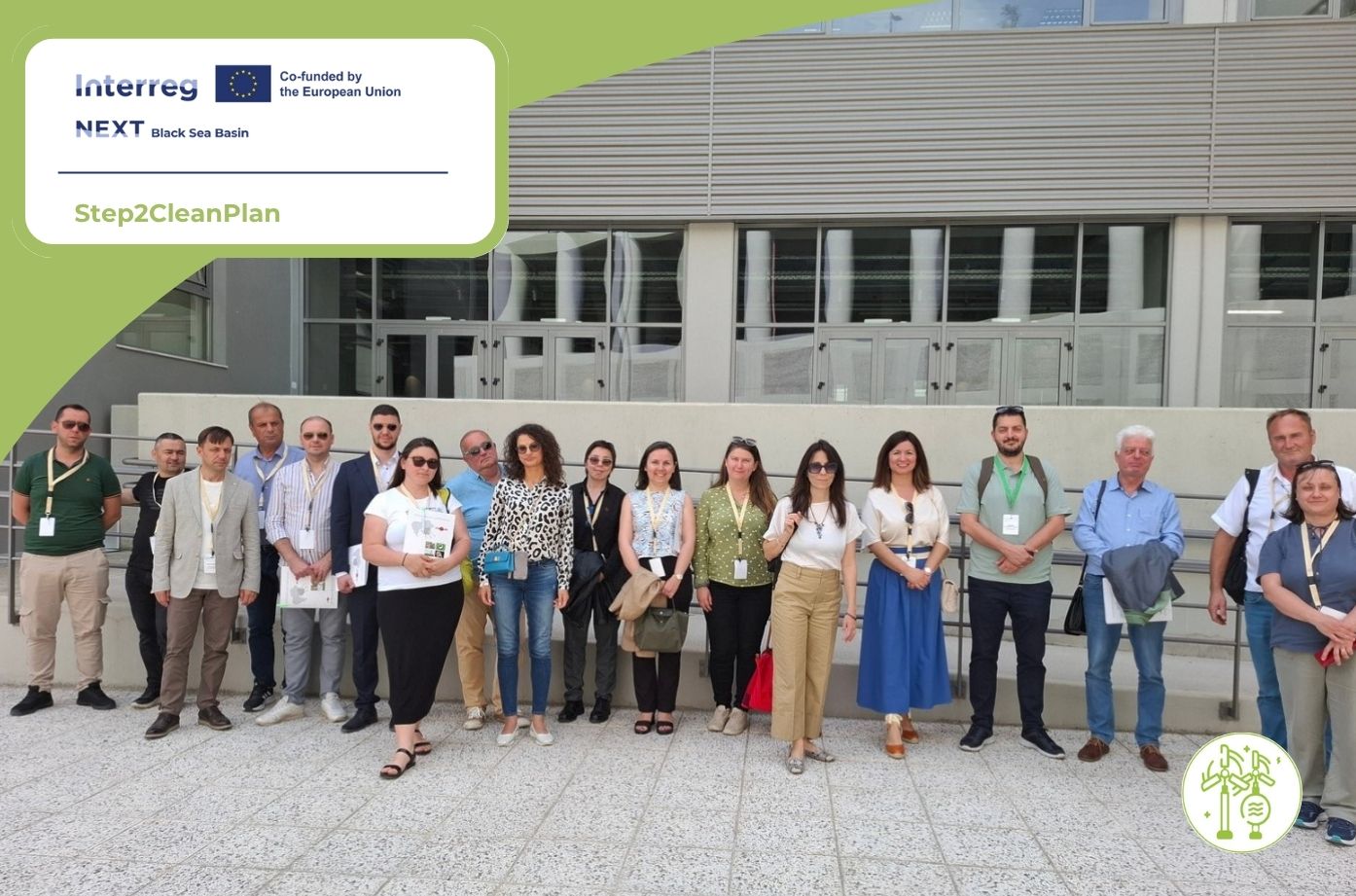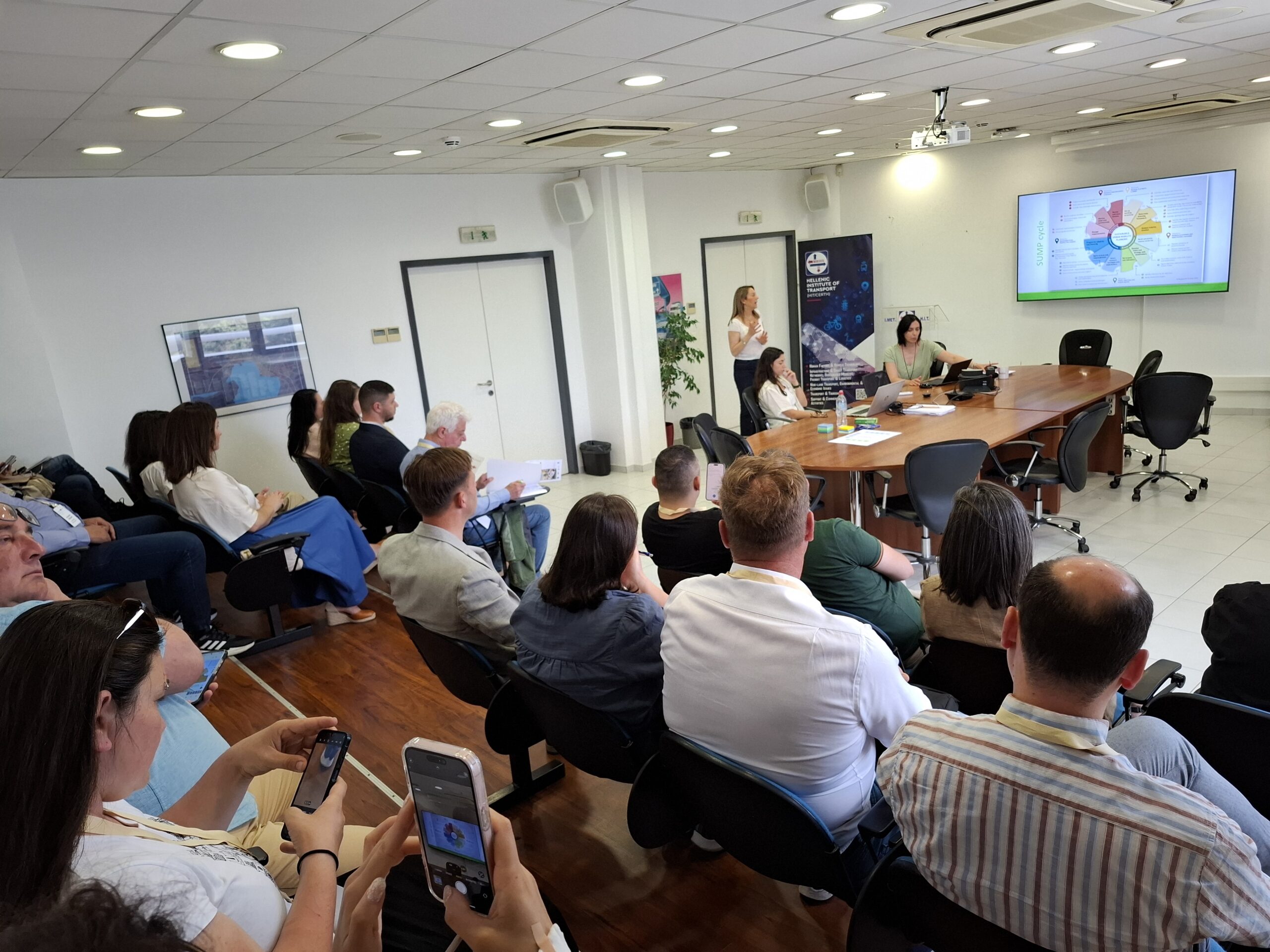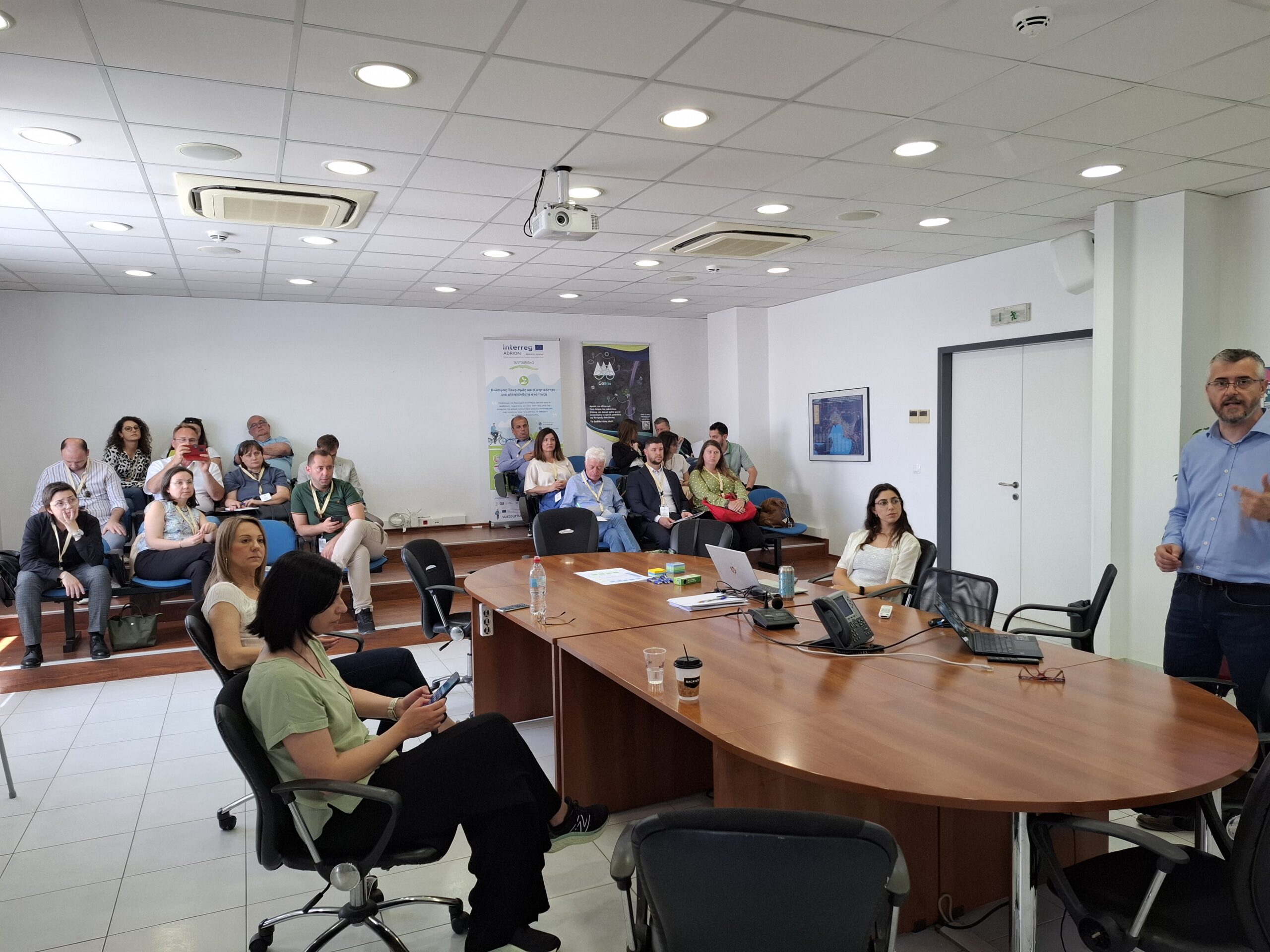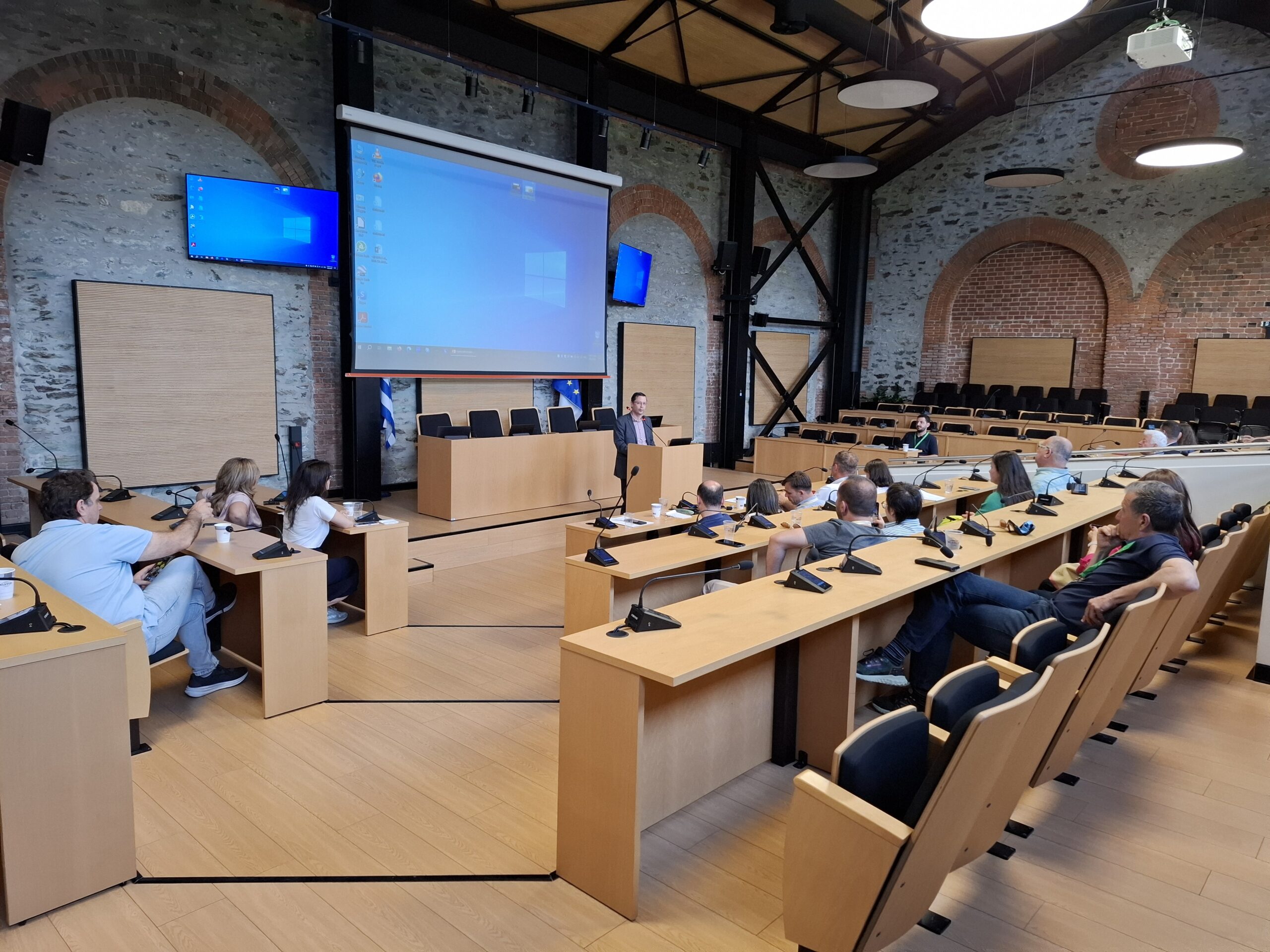On May 28 and 29, 2025, a successful two-day Study Visit was held in Thessaloniki as part of the STEP2CleanPlan project, which is implemented through the Interreg NEXT Black Sea Basin Program.
The Study Visit, organized by ANATOLIKI S.A., brought together 26 representatives from project partners and relevant stakeholders from the participating countries – Greece, Bulgaria, and Turkey – with the aim of exchanging experiences, studying good practices, and promoting innovative approaches in planning and monitoring sustainable development actions and climate change adaptation.
Day 1 – May 28, 2025
- Welcome and Presentations of Local Initiatives
The day began with a visit to the Kalamaria Municipal Council Hall, where Vasso Papadopoulou, Project Manager of STEP2CleanPlan and Director of European Programs at ANATOLIKI S.A., officially welcomed participants and opened the proceedings.
Tasos Chatzieleftheriou, project team member and climate change expert, gave an overview of the two-day program, highlighting the main points and thematic areas.
Following that, Mr. Nikos Misirlis, Deputy Mayor of Environment, Public Lighting, and Infrastructure Maintenance of the Municipality of Kalamaria, emphasized the key role of local authorities in addressing climate change. He also presented the main interventions and policies implemented by the Municipality for sustainable development and energy transition.
Then, Mr. Apostolos Tsolakis, Deputy Mayor of Technical Services of the Municipality of Thermi, presented relevant actions and initiatives, focusing on technical solutions and active citizen engagement aimed at improving energy efficiency and reducing the carbon footprint.
The first visit concluded with a presentation of the Municipal Emissions Reduction Plan (MERP) for Kalamaria by Yiannis Eleftheriadis, project team member and expert from ANATOLIKI S.A., highlighting a 21.63% emissions reduction since 2019. The plan aligns with the National Climate Law (Law 4936/2022).
These three presentations demonstrated the dynamic role of local governments in the wider Thessaloniki area and reinforced the collaborative spirit of the STEP2CleanPlan project.
- Training at the Hellenic Institute of Transport (HIT)
The next stop of the day was a training workshop at HIT, focusing on introducing participants to modern methodologies in designing and implementing sustainable urban mobility.
- Exercise on Sustainable Urban Mobility Plans (SUMP): The session began with an interactive SUMP exercise, guided by experts Dr. Kornilia Kotoula, Dr. Maria Morfoulaki, and Maria Chatziathanasiou, introducing the core principles of SUMP and its strategic role in sustainable city transport planning.
- Logistics in SUMPs: Mr. Orestis Tsolakis presented on the integration of logistics and freight distribution in urban mobility planning, highlighting the importance of balancing people and goods transport in cities.
- “Mobility Living Lab” – Smart Mobility Workshop: The session concluded with a presentation by Dr. Jose Salanova on the Thessaloniki Smart Mobility Living Lab, one of the largest in Europe. It offers real-time traffic data and short-term traffic forecasting, supporting Thessaloniki’s ambition to become a smart logistics hub. Dr. Salanova showcased pilot projects and practical applications in real environments, demonstrating how living labs can support data-driven and participatory policymaking.
HIT provided a unique educational setting that combined theory and hands-on practice, positioning Greece as a hub of expertise in sustainable urban mobility.
- Visit to Thessaloniki Metro Control Center and Archaeological Stations
Participants visited the Metro depot and Central Control Station, where they were briefed on the technologies and challenges of the Thessaloniki Metro project. The tour ended with a visit to culturally significant stations, such as Venizelou Station, which features notable archaeological findings.
Day 2 – May 29, 2025
- Visit to the Region of Central Macedonia (RCM)
On the second day, the group visited the Regional Council Hall in the Region of Central Macedonia, where they attended key presentations on local strategies for sustainable development and climate action. The delegation was warmly welcomed by Mr. Kostas Michailidis, Head of the General Operation and Organization Directorate of RCM, who also shared insights into the historical significance of the building and the ongoing restoration efforts.
- Vassilis Akylas, representative of the Operational Planning and Development Programs Department of the Municipality of Thessaloniki, presented the Municipal Climate Plan and the city’s active participation in the EU Mission: 100 Climate-Neutral and Smart Cities by 2030. He outlined the city’s holistic strategy for carbon footprint reduction, energy efficiency, sustainable mobility, and circular economy, as well as the need to integrate local, national, and EU policies for achieving climate neutrality.
- Evdokia Maggou, from the RCM Directorate of Innovation and Entrepreneurship Support, showed the Sustainable Urban Development Observatory and its capabilities in monitoring and planning regional sustainability policies.
- Energy Upgrade of the Government Building – Ministry of Interior (Macedonia–Thrace Department)
The visit concluded at the energy-upgraded facilities of the Ministry of Interior – Macedonia–Thrace Department, where technical solutions and best practices for improving energy efficiency in public buildings were presented, focusing on lighting and heating systems.
The group was hosted by the Department of Co-Financed Programs and Regional Development, represented by Ioannis Kotziampasis, and guided by architects Souzana Karla and Lila Dedemadi.
The Study Visit served as a powerful platform for knowledge and experience exchange, demonstrating the potential of local authorities and research institutions to design and implement effective climate and energy policies.
Participants returned to their countries with valuable insights and successful local examples, encouraging transnational cooperation and the adaptation and implementation of similar actions within their own contexts.










